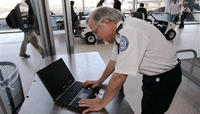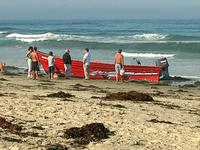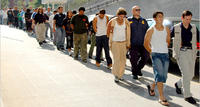-
Mobile biometric and document device for borders
NEC shows a tablet computing device for biometric identity enrollment and verification using multiple biometrics — and which can also read travel documents; the company says the device will be sold to border control agencies
-
-
U.S.: Mexico's drug war posing growing threat to U.S. national security
The Obama administration sees the drug-related violence sweeping Mexico as a growing threat to U.S. national security and has launched a broad review of steps the military and intelligence community could take to help combat what U.S. officials describe as a “narcoinsurgency”; one problem with increased intelligence collaboration: U.S. agencies have been wary of sharing some intelligence because of concerns that some of their Mexican counterparts may be on the payroll of the cartels
-
-
Repeal of birthright citizenship would swell ranks of U.S. unauthorized population

Passage of the House-introduced Birthright Citizenship Act, which would deny U.S. citizenship to children born to parents who are both unauthorized immigrants, would increase the unauthorized population from its current 10.8 million to 16 million by 2050; if U.S. citizenship is denied to children who have one unauthorized immigrant parent, the total unauthorized population would rise to 24 million in 2050 under a scenario in which citizenship is denied to U.S.-born children who have one unauthorized immigrant parent, even if the other parent were a U.S. citizen; under a scenario of denying birthright citizenship to children who have at least one authorized immigrant parent, by the third generation, 6.3 million U.S.-born people would be unauthorized despite having two U.S-born parents
-
-
New legal challenge to DHS laptop searches at U.S. border

The Obama administration has continued a Bush administration policy which permits officers at U.S. borders to detain travelers’ laptop computers and examine their contents even without suspecting the traveler of wrongdoing — or, in the language of DHS policy, “absent individualized suspicion”; in a federal lawsuit filed Tuesday in the Eastern District of New York, the plaintiffs allege that DHS policy of substituting “search at will” for “reasonable suspicion” violates constitutional rights to privacy and free speech
-
-
Illegal immigration to the U.S. dropped sharply since 2007

Between March 2000 and March 2005, 850,000 illegal immigrants entered the United States annually; between March 2007 and March 2009, the number dropped to 300,000 annually; the flow of Mexicans, who represent 60 percent of all illegal immigrants in the United States, plummeted to 150,000 annually during the 2007-9 period, compared with the annual average of 500,000 during the 2000-5 period; experts say that the slowing economy and bleak job market for low-skill workers, not tighter border security, have played the biggest role in the drop in illegal entrants
-
-
Six UAVs to patrol border from California to Texas
DHS secretary Janet Napolitano said that by the beginning of next year, the number of UAVs operating along the U.S.-Mexico border would be up to six, providing “critical aerial surveillance assistance”; previously, drones were not approved by the Federal Aviation Administration (FAA) for use in a stretch of west Texas
-
-
Mexico to up security in border city after blasts
Following a series of explosions in downtown Reynosa, across the border from McAllen, Texas, the Mexican government is rushing reinforcements to the city; at the same time, thirty-five of the seventy-two bodies found in a mass grave on Saturday had been identified: sixteen Hondurans, thirteen Salvadorans, five Guatemalans, and a Brazilian; they were killed after refusing to cooperate with drug gangs
-
-
Businesses cope with Mexico security risks, pass costs to consumers
Faced with the threat of smuggling attempts by criminal organizations in Mexico, foreign companies are simply doing more, spending more, and in the process charging consumers more to shore up security in a country where killings, kidnappings, and extortions have become a part of daily life
-
-
New illegal immigration frontier: the sea

There is a new frontier for illegal immigrants entering the United States — a roughly 400-square-mile ocean expanse that stretches from a bullring on the shores of Tijuana, Mexico, to suburban Los Angeles; in growing numbers, migrants are gambling their lives at sea as land crossings become even more arduous and likely to end in arrest; while only a small fraction of border arrests are at sea; authorities say heightened enforcement on land, and a bigger fence are making the offshore route more attractive
-
-
Money smuggling across border grows despite increased enforcement
U.S. and Mexican law enforcement authorities only seize about 1 percent of cash from drug trafficking, despite increased efforts by both countries; stemming the flow of cash is vital to efforts by the United States and Mexico to take down drug cartels, as drug cartels depend on cash from wholesale drug sales to gangs in the United States
-
-
State of Arizona files Opening Brief in Ninth Circuit Court of Appeals
State of Arizona filed an appeal of Judge Susan Bolton’s decision which accepted many of the Obama administration’s objections to the Arizona Immigration law; the appeal argues that the Arizona law does not amount to a usurpation by the state of federal power
-
-
Mexico deploys Israeli UAVs in war on drug cartels

Since December 2006, nearly 30,000 Mexicans have been killed in that country’s increasingly vicious drug war; the relentless flow of guns from the United States into Mexico has significantly strengthened the drug cartels, allowing them not only to withstand the efforts by the Mexican authorities to impose law and order, but in many cases to take the operational initiative, making large swaths of the country ungovernable; the Mexican government, for its part, is bolstering its own capabilities: last year it has secretly purchased surveillance UAVs from Israel to perform monitoring tasks in border areas and near strategic installations in the country
-
-
Biggest mass graves linked to drug-related violence uncovered in Mexico
Seventy-two bodies found in a mass grave on a ranch in northern Mexico; in recent months an increasing number of mass graves have been discovered; in June, police recovered fifty-five bodies from an abandoned mine near Taxco, in Guerrerro state
-
-
Under Obama: company audits up, illegal worker arrests way down

Under Obama, employer audits are up 50 percent, fines have tripled to almost $3 million, and the number of executives arrested is slightly up over the Bush administration; the numbers of arrests and deportations of illegals taken into custody at work sites, however, plummeted by more than 80 percent from the last year of the Bush; both administrations agree that jobs are the magnet that attracts illegal immigrants to the United States, but critics of the Obama approach say it makes no sense to allow employees known to use fake or stolen identification to go free to duplicate the fraud again
-
-
Border Patrol to buy two new UAV for U.S.-Mexico border
Just-passed border bill includes $32 million to buy two new Predator B turboprop UAV aircraft from General Atomics, as well as fund operating control stations for them; retired Air Force Maj. Gen. Michael Kostelnik, the assistant Customs and Border Protection commissioner for the Office of Air and Marine, told a House subcommittee that twenty-four UAVs would eventually be needed to cover the entire northern and southern borders and U.S. coastlines
-
- All
- Regional
- Water
- Biometrics
- Borders/Immig
- Business
- Cybersecurity
- Detection
- Disasters
- Government
- Infrastructure
- International
- Public health
- Public Safety
- Communication interoperabillity
- Emergency services
- Emergency medical services
- Fire
- First response
- IEDs
- Law Enforcement
- Law Enforcement Technology
- Military technology
- Nonlethal weapons
- Nuclear weapons
- Personal protection equipment
- Police
- Notification /alert systems
- Situational awareness
- Weapons systems
- Sci-Tech
- Sector Reports
- Surveillance
- Transportation
Advertising & Marketing: advertise@newswirepubs.com
Editorial: editor@newswirepubs.com
General: info@newswirepubs.com
2010-2011 © News Wire Publications, LLC News Wire Publications, LLC
220 Old Country Road | Suite 200 | Mineola | New York | 11501
Permissions and Policies
Editorial: editor@newswirepubs.com
General: info@newswirepubs.com
2010-2011 © News Wire Publications, LLC News Wire Publications, LLC
220 Old Country Road | Suite 200 | Mineola | New York | 11501
Permissions and Policies
